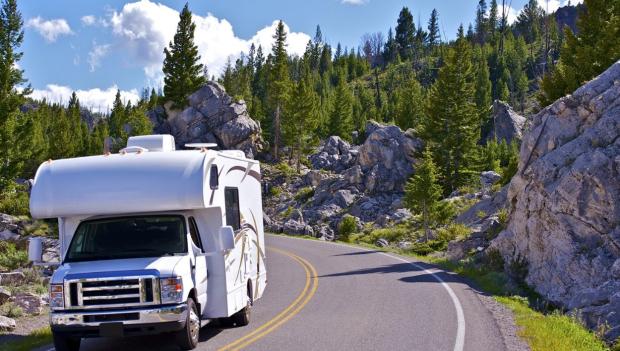
RV camping is booming in popularity and there’s a good reason: camping in an RV means that you can bring all of the comforts of home with you to the campground. Gone are the worries about airline tickets, hotel rooms and finding a place to eat three times a day. Everything you need can be onboard with you at all times. There’s really no better way to experience your very own Great American Road Trip than with the freedom and mobility that an RV provides. If you want to rent an RV, check out RVshare, search for a RV campsite and finally experience #RVlife for yourself, here’s what you need to know to get started.
How RV Rentals Work
If you want to see if RV camping is for you, check out RVshare to search RV rental options across the country. They make the whole process simple and fun! They’ll connect you to owners in your local area, or at your destination and offer the largest selection of trusted RV rentals in the country. You can search through thousands of options including Luxury Class A Diesel Pushers, Class B Camper Vans, Class C Motorhomes, and Travel Trailers. Plus you can rent with confidence with their Worry-Free Rental Guarantee.
Most RV rentals allow you to drive the RV anywhere in the United States (with some restrictions) and into Canada. However, travel into Mexico is not typically allowed.
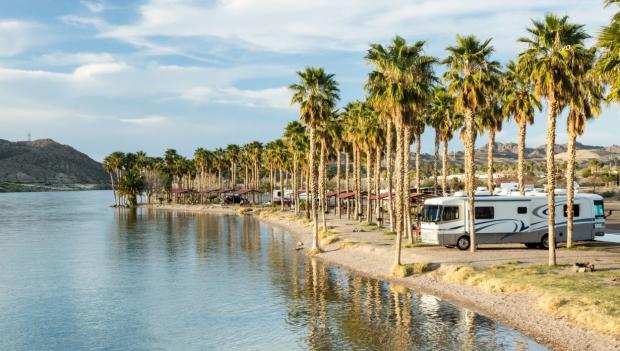
Recommended: Search our directory of RV campgrounds across America
RV Skills to Know
The thought of learning the ins and outs of how to operate an RV can feel overwhelming. Luckily, if you’re used to driving a car, much of the way an RV operates is common sense. Keep in mind that there are different classes of RVs. Many of them – especially those labeled as class “C” – drive just like a regular vehicle. Class “C” RVs have a van chassis.
Rental companies will usually provide orientation so that renters are familiar with the operation of the RV before they hit the road. Actions such as how to work a generator, how to connect to power and water at the campground and how to use a dump station may be unfamiliar to you. If this isn’t covered in orientation, ask the rental company to explain the process before you hit the road.
Check with your RV rental company to see if there are any areas of the country that are off limits. Some rental companies do not allow renters to take their RVs on unpaved logging roads, for example.
Many people considering renting RVs are worried about what they’ll do if the RV breaks down. Most RV rental services provide a 24-hour assistance phone line or even free roadside assistance to help you get back up in running in the event of a breakdown.
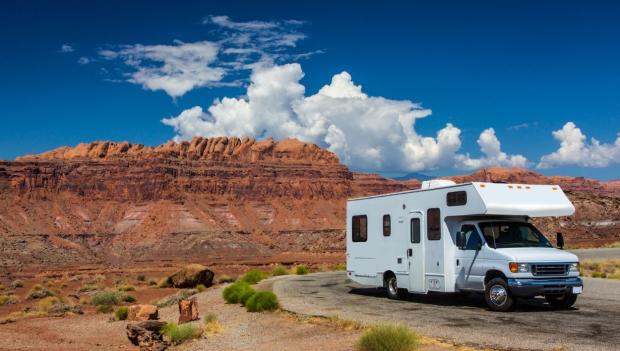
How RV Campgrounds Work
When you’re camping with an RV, there are some specific amenities to look for in a campground that will allow you to use all of the features of your RV.
The first thing to do is ensure that your RV will fit in the campsite you would like to reserve. Most campgrounds will list the maximum size of RV that will fit at that campsite when you book online. For example, a campsite will be listed as 55’, meaning all campers 55’ and shorter will fit at that site. Larger RVs should look for pull-through sites, meaning you can pull your rig through instead of backing in.
Campgrounds will have either primitive, partial hookup or full hookup campsites.
1. Primitive campsites typically do not have water or electricity available at the site. Some of these campgrounds do not have flush toilets or showers, either.
2. Partial hookup campsites generally have sites with water and electric hookups, but no sewer. This means you can have electricity and running water inside of your RV, but you will have to use a dump station to empty your black and gray water tanks.
3. Full hookup campsites have electricity, water and sewer connections. Some campgrounds may also have cable television and telephone line hookups and free Wi-Fi.
Keep in mind that when you book a RV campsite you can use the full campground amenities. This will often include restrooms, showers, laundry and other “extras” like the game room or pool.
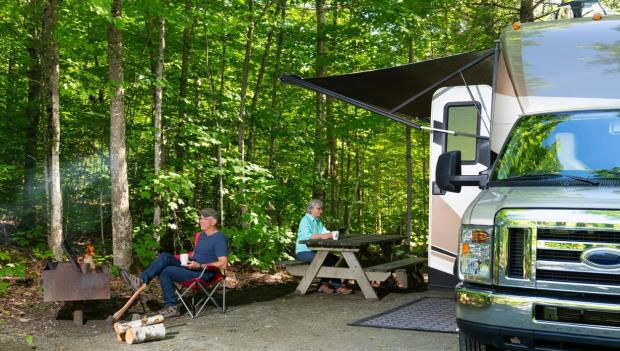
Recommended: Search for and book the best RV campgrounds in America
What to Bring on Your RV Camping Trip
When packing for a RV camping trip there are some essential items you’ll want to bring for comfort and convenience. Before packing these items you should ask if they are already included with the RV rental. If you are renting from a private owner, many of these items could be included. If you are renting from a company like Cruise America, you have the option of renting kits that include the necessities:
- Bedding such as sheets, pillow cases and a comforter or sleeping bags
- Pillows
- Towels and wash cloths
- Dish towels
- Cleaning supplies such as a broom and dust pan, an all-purpose cleaner, dish soap and a sponge
- Cookware and any meal-specific items, like a colander, can opener, wine opener and steak knives
- Trash bags
- Coffee mugs and drinking glasses
- Dishware and silverware
- Camping chairs
- Light sources such as a flashlight, lantern and headlamp
- Leveling jacks (if there is not an auto-leveling system)
- A space heater if camping in extremely cold weather (even if your RV has heat)
- Laundry bag to keep clean clothes separate from dirty items
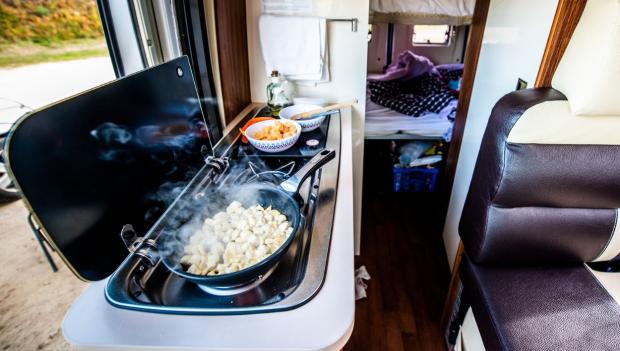
You’ll also want to consider whether you’d like to tow a vehicle behind your camper so that you have the freedom to drive away from the campsite for daytime adventures, or if you’d prefer to walk where you want to go. Many rental companies do allow for the towing of a vehicle behind the RV. While most of them will provide renters with a receiver hitch, the renter is usually responsible for bringing their own tow bar. Sometimes there is an additional daily fee to tow a vehicle with the RV rental.
Check with your Local Government Organization
Many policies have been established to counter and control the coronavirus outbreak. State and local officials have been taking decisive action to stop the spread. The policies vary by state, sometimes to a great degree. When you book a reservation, make sure to review the park and state’s latest rules and regulations prior to your visit.
For COVID-19 updates, please visit our Impacted Park List and Reservation Guide for the latest information.